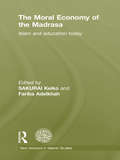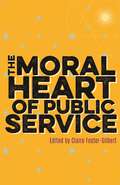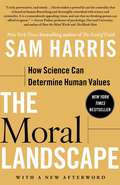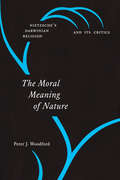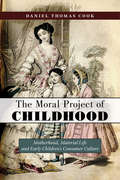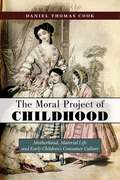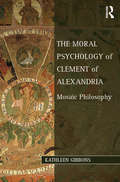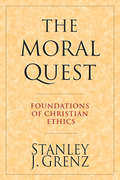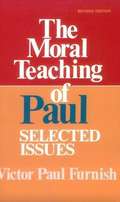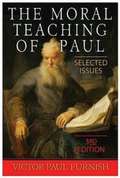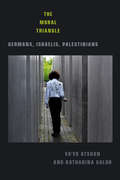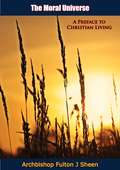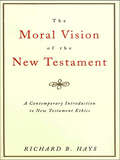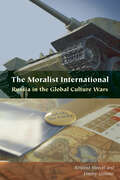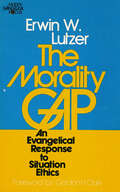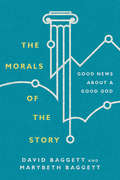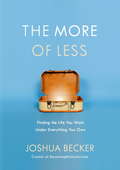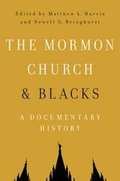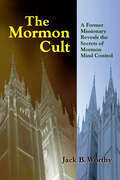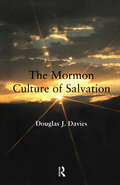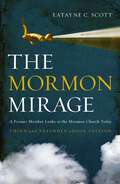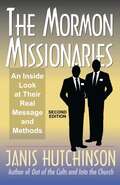- Table View
- List View
The Moral Economy of the Madrasa: Islam and Education Today (New Horizons in Islamic Studies)
by Fariba Adelkhah Sakurai KeikoThe revival of madrasas in the 1980s coincided with the rise of political Islam and soon became associated with the "clash of civilizations" between Islam and the West. This volume examines the rapid expansion of madrasas across Asia and the Middle East and analyses their role in society within their local, national and global context. Based on anthropological investigations in Afghanistan, Bangladesh, China, Iran, and Pakistan, the chapters take a new approach to the issue, examining the recent phenomenon of women in madrasas; Hui Muslims in China; relations between the Iran’s Shia seminary after the 1979-Islamic revolution and Shia in Pakistan and Afghanistan; and South Asian madrasas. Emphasis is placed on the increased presence of women in these institutions, and the reciprocal interactions between secular and religious schools in those countries. Taking into account social, political and demographic changes within the region, the authors show how madrasas have been successful in responding to the educational demand of the people and how they have been modernized their style to cope with a changing environment. A timely contribution to a subject with great international appeal, this book will be of great interest to students and scholars of international politics, political Islam, Middle East and Asian studies and anthropology.
The Moral Heart of Public Service
by William Hague Rowan Williams John Hall Andrew Tremlett Claire Foster-Gilbert Mary Mcaleese Peter Hennessy Stephen Lamport The Dean Westminster Vernon WhiteNow more than ever, public servants must consider and reassess how to keep moral courage in public life alive. With ethical expectations and needs changing and government policies under increasing moral scrutiny, Claire Foster-Gilbert of Westminster Abbey Institute gathers a series of essays and lectures by herself and others, exploring the meaning of 'moral code' in today's public service, and how it can be rekindled in practice. Timely and timeless, the book is founded on traditional values of honesty, moral rigour and neighbourliness, and discusses how to champion stability, peace, community and virtue in contemporary public life. The authors, including eminent figures such as the former President of Ireland Mary McAleese, historian Peter Hennessy, former First Secretary of State William Hague and former Archbishop of Canterbury Rowan Williams, explain how realistic compromises can be balanced with clear goal-setting for ideal results. Forward-thinking and authoritative, this book will be a precious resource to anyone seeking to boost the circulation of integrity throughout all aspects of public life.
The Moral Landscape: How Science Can Determine Human Values
by Sam HarrisNew York Times bestselling author Sam Harris&’s first book, The End of Faith, ignited a worldwide debate about the validity of religion. In the aftermath, Harris discovered that most people—from religious fundamentalists to non-believing scientists—agree on one point: science has nothing to say on the subject of human values. Indeed, our failure to address questions of meaning and morality through science has now become the primary justification for religious faith.In this highly controversial book, Sam Harris seeks to link morality to the rest of human knowledge. Defining morality in terms of human and animal well-being, Harris argues that science can do more than tell how we are; it can, in principle, tell us how we ought to be. In his view, moral relativism is simply false—and comes at an increasing cost to humanity. And the intrusions of religion into the sphere of human values can be finally repelled: for just as there is no such thing as Christian physics or Muslim algebra, there can be no Christian or Muslim morality. Using his expertise in philosophy and neuroscience, along with his experience on the front lines of our “culture wars,” Harris delivers a game-changing book about the future of science and about the real basis of human cooperation.
The Moral Meaning of Nature: Nietzsche’s Darwinian Religion and Its Critics
by Peter J. WoodfordWhat, if anything, does biological evolution tell us about the nature of religion, ethical values, or even the meaning and purpose of life? The Moral Meaning of Nature sheds new light on these enduring questions by examining the significance of an earlier—and unjustly neglected—discussion of Darwin in late nineteenth-century Germany. We start with Friedrich Nietzsche, whose writings staged one of the first confrontations with the Christian tradition using the resources of Darwinian thought. The lebensphilosophie, or “life-philosophy,” that arose from his engagement with evolutionary ideas drew responses from other influential thinkers, including Franz Overbeck, Georg Simmel, and Heinrich Rickert. These critics all offered cogent challenges to Nietzsche’s appropriation of the newly transforming biological sciences, his negotiation between science and religion, and his interpretation of the implications of Darwinian thought. They also each proposed alternative ways of making sense of Nietzsche’s unique question concerning the meaning of biological evolution “for life.” At the heart of the discussion were debates about the relation of facts and values, the place of divine purpose in the understanding of nonhuman and human agency, the concept of life, and the question of whether the sciences could offer resources to satisfy the human urge to discover sources of value in biological processes. The Moral Meaning of Nature focuses on the historical background of these questions, exposing the complex ways in which they recur in contemporary philosophical debate.
The Moral Project of Childhood: Motherhood, Material Life, and Early Children's Consumer Culture
by Daniel Thomas CookExamines the Protestant origins of motherhood and the child consumer Throughout history, the responsibility for children’s moral well-being has fallen into the laps of mothers. In The Moral Project of Childhood, the noted childhood studies scholar Daniel Thomas Cook illustrates how mothers in the nineteenth-century United States meticulously managed their children’s needs and wants, pleasures and pains, through the material world so as to produce the “child” as a moral project. Drawing on a century of religiously-oriented child care advice in women’s periodicals, he examines how children ultimately came to be understood by mothers—and later, by commercial actors—as consumers. From concerns about taste, to forms of discipline and punishment, to play and toys, Cook delves into the social politics of motherhood, historical anxieties about childhood, and early children’s consumer culture. An engaging read, The Moral Project of Childhood provides a rich cultural history of childhood.
The Moral Project of Childhood: Motherhood, Material Life, and Early Children's Consumer Culture
by Daniel Thomas CookExamines the Protestant origins of motherhood and the child consumer Throughout history, the responsibility for children’s moral well-being has fallen into the laps of mothers. In The Moral Project of Childhood, the noted childhood studies scholar Daniel Thomas Cook illustrates how mothers in the nineteenth-century United States meticulously managed their children’s needs and wants, pleasures and pains, through the material world so as to produce the “child” as a moral project. Drawing on a century of religiously-oriented child care advice in women’s periodicals, he examines how children ultimately came to be understood by mothers—and later, by commercial actors—as consumers. From concerns about taste, to forms of discipline and punishment, to play and toys, Cook delves into the social politics of motherhood, historical anxieties about childhood, and early children’s consumer culture. An engaging read, The Moral Project of Childhood provides a rich cultural history of childhood.
The Moral Psychology of Clement of Alexandria: Mosaic Philosophy (Studies in Philosophy and Theology in Late Antiquity)
by Kathleen GibbonsIn The Moral Psychology of Clement of Alexandria, Kathleen Gibbons proposes a new approach to Clement’s moral philosophy and explores how his construction of Christianity’s relationship with Jewishness informed, and was informed by, his philosophical project. As one of the earliest Christian philosophers, Clement’s work has alternatively been treated as important for understanding the history of relations between Christianity and Judaism and between Christianity and pagan philosophy. This study argues that an adequate examination of his significance for the one requires an adequate examination of his significance for the other. While the ancient claim that the writings of Moses were read by the philosophical schools was found in Jewish, Christian, and pagan authors, Gibbons demonstrates that Clement’s use of this claim shapes not only his justification of his authorial project, but also his philosophical argumentation. In explaining what he took to be the cosmological, metaphysical, and ethical implications of the doctrine that the supreme God is a lawgiver, Clement provided the theoretical justifications for his views on a range of issues that included martyrdom, sexual asceticism, the status of the law of Moses, and the relationship between divine providence and human autonomy. By contextualizing Clement’s discussions of volition against wider Greco-Roman debates about self-determination, it becomes possible to reinterpret the invocation of “free will” in early Christian heresiological discourse as part of a larger dispute about what human autonomy requires.
The Moral Quest: Foundations of Christian Ethics
by Stanley J. GrenzVoted one of Christianity Today's 1998 Books of the Year What is ethics? Why should Christians care? Beginning with these basic questions, Stanley Grenz masterfully leads his readers into a theological engagement with moral inquiry. In The Moral Quest he sets forth the basics of ethics, considers the role and methods of Christian ethics in particular, and examines the ethical approaches of the Old Testament, the Gospels and Paul. He introduces the foundational theological ethics of Augustine, Thomas Aquinas, and Luther and the Reformers. And he concludes with an evenhanded discussion of modern and contemporary Christian ethicists, including Albert Ritschl, Walter Rauschenbusch, Karl Barth, James Gustafson, Paul Ramsey, Dietrich Bonhoeffer, Martin Luther King Jr., Gustavo Gutiérrez, Rosemary Radford Ruether, Stanley Hauerwas, Carl F. H. Henry and Oliver O'Donovan. Clear, concise, and well apprised of relevant literature, Grenz (a theologian recognized for the excellence of his own theological and ethical work) provides in this book a first-rate introduction to Christian ethics. The Moral Quest will well serve students, pastors and interested laypersons alike.
The Moral Teaching of Paul: Selected Issues
by Victor Paul FurnishDr. Furnish enriches his discussion of key Pauline topics including: sex, marriage, divorce, homosexuality, women in the church, and the Church in the world. He pays particular attention to the socio-cultural context of Paul's ministry, the complexity of his thought, the character of his moral reasoning, and the way his thought and reasoning may inform and challenge us today.
The Moral Teaching of Paul: Selected Issues, 3rd Edition
by Victor Paul FurnishIn this expanded and updated third edition of an important work, respected Pauline scholar Victor Paul Furnish presents an analysis of some of Paul's most famous yet often misunderstood ethical teachings.Dr. Furnish enriches his discussion of key Pauline topics including: sex, marriage, divorce, homosexuality, women in the church, and the Church in the world. He pays particular attention to the socio-cultural context of Paul's ministry, the complexity of his thought, the character of his moral reasoning, and the way his thought and reasoning may inform and challenge us today.Victor Paul Furnish is University Distinguished Professor of New Testament, Emeritus at Perkins School of Theology, Southern Methodist University, and general editor of the Abingdon New Testament Commentaries.
The Moral Triangle: Germans, Israelis, Palestinians
by Katharina Galor Sa'ed AtshanBerlin is home to Europe’s largest Palestinian diaspora community and one of the world’s largest Israeli diaspora communities. Germany’s guilt about the Nazi Holocaust has led to a public disavowal of anti-Semitism and strong support for the Israeli state. Meanwhile, Palestinians in Berlin report experiencing increasing levels of racism and Islamophobia. In The Moral Triangle Sa’ed Atshan and Katharina Galor draw on ethnographic fieldwork and interviews with Israelis, Palestinians, and Germans in Berlin to explore these asymmetric relationships in the context of official German policies, public discourse, and the private sphere. They show how these relationships stem from narratives surrounding moral responsibility, the Holocaust, the Israel/Palestine conflict, and Germany’s recent welcoming of Middle Eastern refugees. They also point to spaces for activism and solidarity among Germans, Israelis, and Palestinians in Berlin that can help foster restorative justice and account for multiple forms of trauma. Highlighting their interlocutors’ experiences, memories, and hopes, Atshan and Galor demonstrate the myriad ways in which migration, trauma, and contemporary state politics are inextricably linked.
The Moral Universe: A Preface to Christian Living
by Archbishop Fulton J SheenIn this book Archbishop Sheen reflects on Christian Ethics and provides guidance on how to improve one’s life.Fulton J. Sheen (1895-1979) was one of the best-loved prelates of twentieth century Catholicism. A prolific writer and orator, a distinguished scholar and teacher, an influential master of the media, Bishop Sheen was one of the most effective communicators of our time. His scores of books have offered inspiration, profound thought, and penetrating analysis of Christian faith and life.
The Moral Vision of the New Testament: A Contemporary Introduction to New Testament Ethics
by Richard B. HaysA leading expert in New Testament ethics discovers in the biblical witness a unified ethical vision -- centered in the themes of community, cross and new creation -- that has profound relevance in today′s world. Richard Hays shows how the New Testament provides moral guidance on the most troubling ethical issues of our time, including violence, divorce, homosexuality and abortion.
The Moralist International: Russia in the Global Culture Wars (Orthodox Christianity and Contemporary Thought)
by Kristina Stoeckl Dmitry UzlanerThe Moralist International analyzes the role of the Russian Orthodox Church and the Russian state in the global culture wars over gender and reproductive rights and religious freedom. It shows how the Russian Orthodox Church in the past thirty years first acquired knowledge about the dynamics, issues, and strategies of Right- Wing Christian groups; how the Moscow Patriarchate has shaped its traditionalist agenda accordingly; and how the close alliance between church and state has turned Russia into a norm entrepreneur for international moral conservativism. Including detailed case studies of the World Congress of Families, anti-abortion activism, and the global homeschooling movement, the book identifies the key factors, causes, and actors of this process. Kristina Stoeckl and Dmitry Uzlaner then develop the concept of conservative aggiornamento to describe Russian traditionalism as the result of conservative religious modernization and the globalization of Christian social conservatism.The Moralist International continues a line of research on the globalization of the culture wars that challenges the widespread perception that it is only progressive actors who use the international human rights regime to achieve their goals by demonstrating that conservative actors do the same. The book offers a new, original perspective that firmly embeds the conservative turn of post-Soviet Russia in the transnational dynamics of the global culture wars.The Moralist International is available from the publisher on an open-access basis.
The Morality Gap: An Evangelical Response to Situation Ethics
by Erwin W. LutzerWith the conviction that "the gap between traditional morality and the avant-garde approach is widening," Erwin W. Lutzer offers this precise, easy-to-understand, and knowledgeable critique of situation ethics.This presentation adds new insights to the discussion of morality and the ethic of love. Lutzer pinpoints the fallacies of the situationalist's philosophy and offers a biblical alternative that clearly recognizes and deals with moral conflicts.
The Morality Gap: An Evangelical Response to Situation Ethics
by Erwin W. LutzerWith the conviction that "the gap between traditional morality and the avant-garde approach is widening," Erwin W. Lutzer offers this precise, easy-to-understand, and knowledgeable critique of situation ethics.This presentation adds new insights to the discussion of morality and the ethic of love. Lutzer pinpoints the fallacies of the situationalist's philosophy and offers a biblical alternative that clearly recognizes and deals with moral conflicts.
The Morals of the Story: Good News About a Good God
by David Baggett Marybeth BaggettChristianity Today
The More of Less: Finding the Life You Want Under Everything You Own
by Joshua BeckerDon't Settle for More Most of us know we own too much stuff. We feel the weight and burden of our clutter, and we tire of cleaning and managing and organizing. While excess consumption leads to bigger houses, faster cars, fancier technology, and cluttered homes, it never brings happiness. Rather, it results in a desire for more. It redirects our greatest passions to things that can never fulfill. And it distracts us from the very life we wish we were living. Live a better life with less. In The More of Less, Joshua Becker, helps you.... * recognize the life-giving benefits of owning less * realize how all the stuff you own is keeping you from pursuing your dreams * craft a personal, practical approach to decluttering your home and life * experience the joys of generosity * learn why the best part of minimalism isn't a clean house, it's a full life The beauty of minimalism isn't in what it takes away. It's in what it gives. Make Room in Your Life for What You Really Want "Maybe you don't need to own all this stuff." After a casual conversation with his neighbor on Memorial Day 2008, Joshua Becker realized he needed a change. He was spending far too much time organizing possessions, cleaning up messes, and looking for more to buy. So Joshua and his wife decided to remove the nonessential possessions from their home and life. Eventually, they sold, donated, or discarded over 60 percent of what they owned. In exchange, they found a life of more freedom, more contentment, more generosity, and more opportunity to pursue the things that mattered most. The More of Less delivers an empowering plan for living more by owning less. With practical suggestions and encouragement to personalize your own minimalist style, Joshua Becker shows you why minimizing possessions is the best way to maximize life. Are you ready for less cleaning, less anxiety, and less stress in your life? Simplicity isn't as complicated as you think.From the Hardcover edition.
The More the Merrier: An Amish Christmas Romance
by Linda BylerA Heartwarming Christmas Romance Set During the Great Depression It’s 1931, and times are tough for the Miller family, who are raising eight children in the midst of the Great Depression. When Eli Miller passes away unexpectedly, and then a fire destroys their barn, Annie has no idea how she’ll make ends meet. The Amish community rallies around her and the children, as is their custom, but as days turn into weeks and then into months, Annie’s friends and neighbors return to their own routines and seem to expect Annie to do the same. Annie knows she needs to stay strong for the children and figure out a way to keep everyone warm and clothed and fed, but she is heartbroken and exhausted. She reminds herself that God will provide, but every day feels like an uphill battle. When Annie receives a letter from a widower with six children of his own, she tries to put it out of her mind. Her critical mother reminds her that it's too soon to start a new friendship with a man, and warns her that blending a family will be complicated. In the weeks and months to follow, Annie must learn to make her own decisions—and accept the consequences, good and bad—face her past, and embark on a new journey that will transform her and her large, complicated family. When life seems especially complicated one summer, she finds herself saying that by Christmas everything will start to come together, but she has no idea the challenges—and ultimately blessings—headed her way.
The Mormon Church and Blacks: A Documentary History
by Newell G. Bringhurst Matthew L HarrisThe year 1978 marked a watershed year in the history of The Church of Jesus Christ of Latter-day Saints as it lifted a 126-year ban on ordaining black males for the priesthood. This departure from past practice focused new attention on Brigham Young's decision to abandon Joseph Smith's more inclusive original teachings. The Mormon Church and Blacks presents thirty official or authoritative Church statements on the status of African Americans in the Mormon Church. Matthew L. Harris and Newell G. Bringhurst comment on the individual documents, analyzing how they reflected uniquely Mormon characteristics and contextualizing each within the larger scope of the history of race and religion in the United States. Their analyses consider how lifting the ban shifted the status of African Americans within Mormonism, including the fact that African Americans, once denied access to certain temple rituals considered essential for Mormon salvation, could finally be considered full-fledged Latter-day Saints in both this world and the next. Throughout, Harris and Bringhurst offer an informed view of behind-the-scenes Church politicking before and after the ban. The result is an essential resource for experts and laymen alike on a much-misunderstood aspect of Mormon history and belief.
The Mormon Cult: A Former Missionary Reveals the Secrets of Mormon Mind Control
by Jack B. WorthyScrutinizing the experience of growing up Mormon, this personal narrative tells the story of one man's disillusionment with his faith and subsequent excommunication from the Church. This account reveals what is posited as inherent racism and sexism within the church and seeks to expose the controlling methods of indoctrination and the harsh process of excommunication. The basic tenets of the religion are explained, personal stories and analyses are shared, and church authorities are cited to support the claims of extreme gender and racial discrimination. From unknowing follower to angry rebel, and finally to a content, worldly man, this book recounts the experience of a survivor who feels the duty to explain his truth.
The Mormon Culture of Salvation
by Douglas J. DaviesThe Mormon Culture of Salvation presents a comprehensive study of Mormon cultural and religious life, offering important new theories of Mormonism - one of the fastest growing movements and thought by many to be the next world religion. Bringing social, scientific and theological perspectives to bear on the Church of Jesus Christ of Latter-day Saints, Douglas Davies draws from theology, history of religions, anthropology, sociology and psychology to present a unique example of a truly interdisciplinary analysis in religious studies. Examining the many aspects of Mormon belief, ritual, family life and history, this book presents a new interpretation of the origin of Mormonism, arguing that Mormonism is rooted in the bereavement experience of Joseph Smith, which influenced the development of temple ritual for the dead and the genealogical work of many Mormon families. Davies shows how the Mormon commitment to work for salvation relates to current Mormon belief in conversion, and to traditional Christian ideas of grace. The Mormon Culture of Salvation is an important work for Mormons and non-Mormons alike, offering fresh insights into how Mormons see the world and work for their future glory in heavenly realms. Written by a non-Mormon with over 30 years' research experience into Mormonism, this book is essential reading for those seeking insights into new interdisciplinary forms of analysis in religion, as well as all those studying or interested in Mormonism and world religions. Douglas J. Davies is Professor in the Study of Religion in the Department of Theology, Durham University, UK. He is the author of many books including Death, Ritual and Belief (Cassell, 1997), Mormon Identities in Transition (Cassell, 1994), Mormon Spirituality (1987), and Meaning and Salvation in Religious Studies (Brill, 1984).
The Mormon Jesus: A Biography
by John G. TurnerFor two centuries, Jesus has connected the Latter-day Saints to broader currents of Christianity, even while particular Mormon beliefs have been points of differentiation. From the author of the definitive life of Brigham Young comes a biography of the Mormon Jesus that enriches our understanding of The Church of Jesus Christ of Latter-day Saints.
The Mormon Mirage: A Former Member Looks at the Mormon Church Today
by Latayne C. ScottIn the first edition of The Mormon Mirage, Latayne C. Scott shared her remarkable journey out of Mormonism as she uncovered shocking inaccuracies, inconsistencies, and contradictions in the faith she had loved and lived. Thirty years later, Mormonism and Mormon scholarship have evolved with the times. In this third, revised and updated edition of her well-known book, Scott keeps pace with changes and advances in Mormonism, and reveals formidable new challenges to its claims and teachings. The Mormon Mirage provides fascinating, carefully documented insights into • DNA research’s withering implications for the Book of Mormon • the impact of new “revelations” on Latter-day Saint (LDS) race relations • new findings about Mormon history • increasing publicity about LDS splinter groups, particularly polygamous ones • recent disavowals of long-held doctrines by church leadership • the rise of Mormon apologetics on the Internet More than a riveting, insider’s scrutiny of the Mormon faith, this book is a testimony to the trustworthiness of Scripture and the grace of Jesus Christ.
The Mormon Missionaries: An Inside Look At Their Real Message And Methods
by Janis HutchinsonEach year thousands of young people serve as door-to-door witnesses to spread their "restored gospel." Have you ever wondered what you would do if the Mormon Missionaries knocked on your door? Do you know enough to carry on a conversation with them? If not, then this book is for you. In this second and updated edition, author Janis Hutchinson goes behind the appearances to examine the Mormon missionary program, from its unorthodox theological beliefs and political agenda for America, to its carefully planned strategies to win converts. The book contains updated statistics, and is heavily researched and documented with 46 pages of endnotes. "A researcher's dream!" stated one reviewer. It also includes a new chapter not found in the first edition that describes the LDS Church's present evangelistic manual, Preach My Gospel, in which it outlines the missionaries' lesson material, pointing out how it differs from the 1986 Uniform System for Teaching the Gospel, used up until 2003. "One of the most impressive aspects of this book," another reviewer said, "is the respect that Ms. Hutchinson shows toward members of the Mormon Church."
